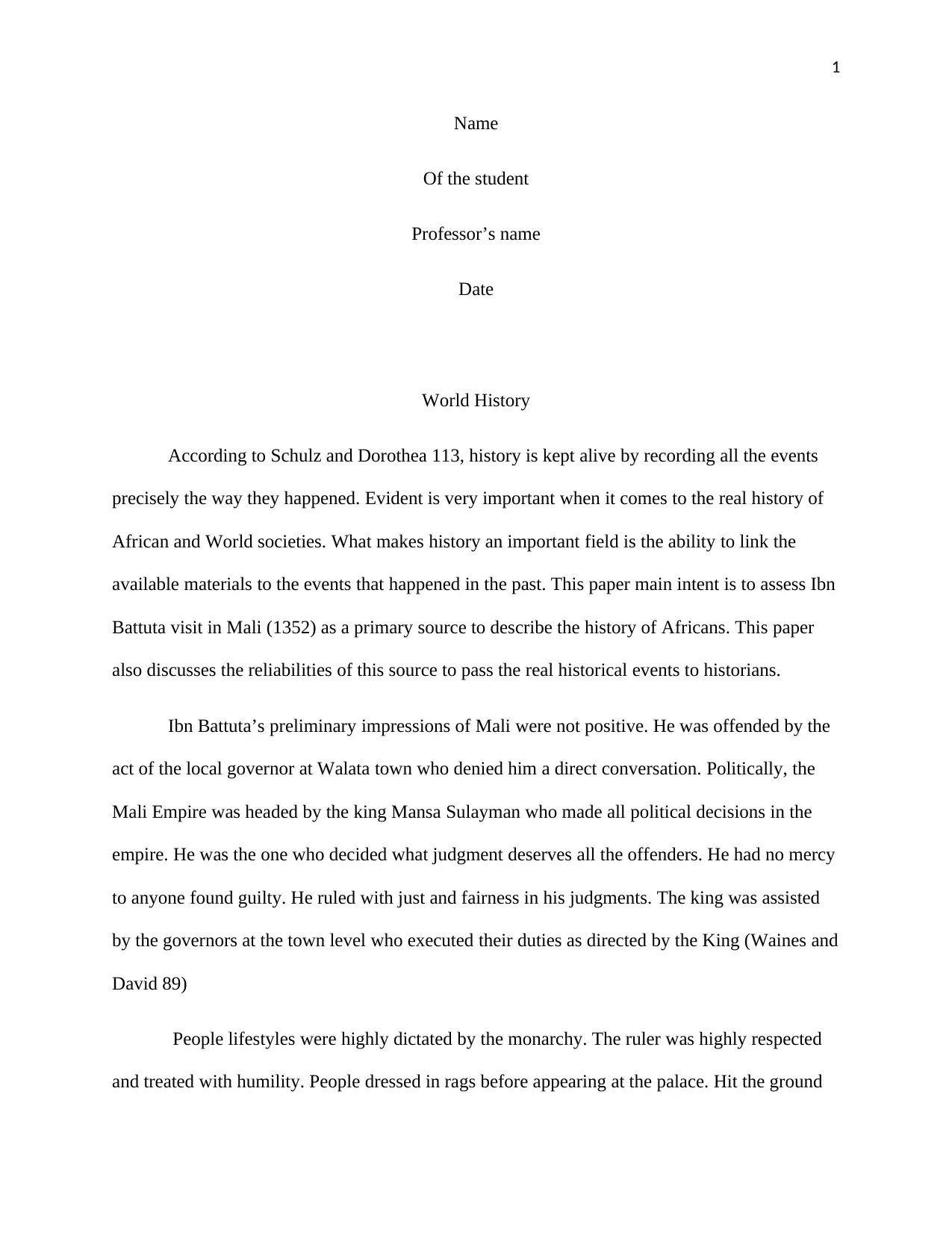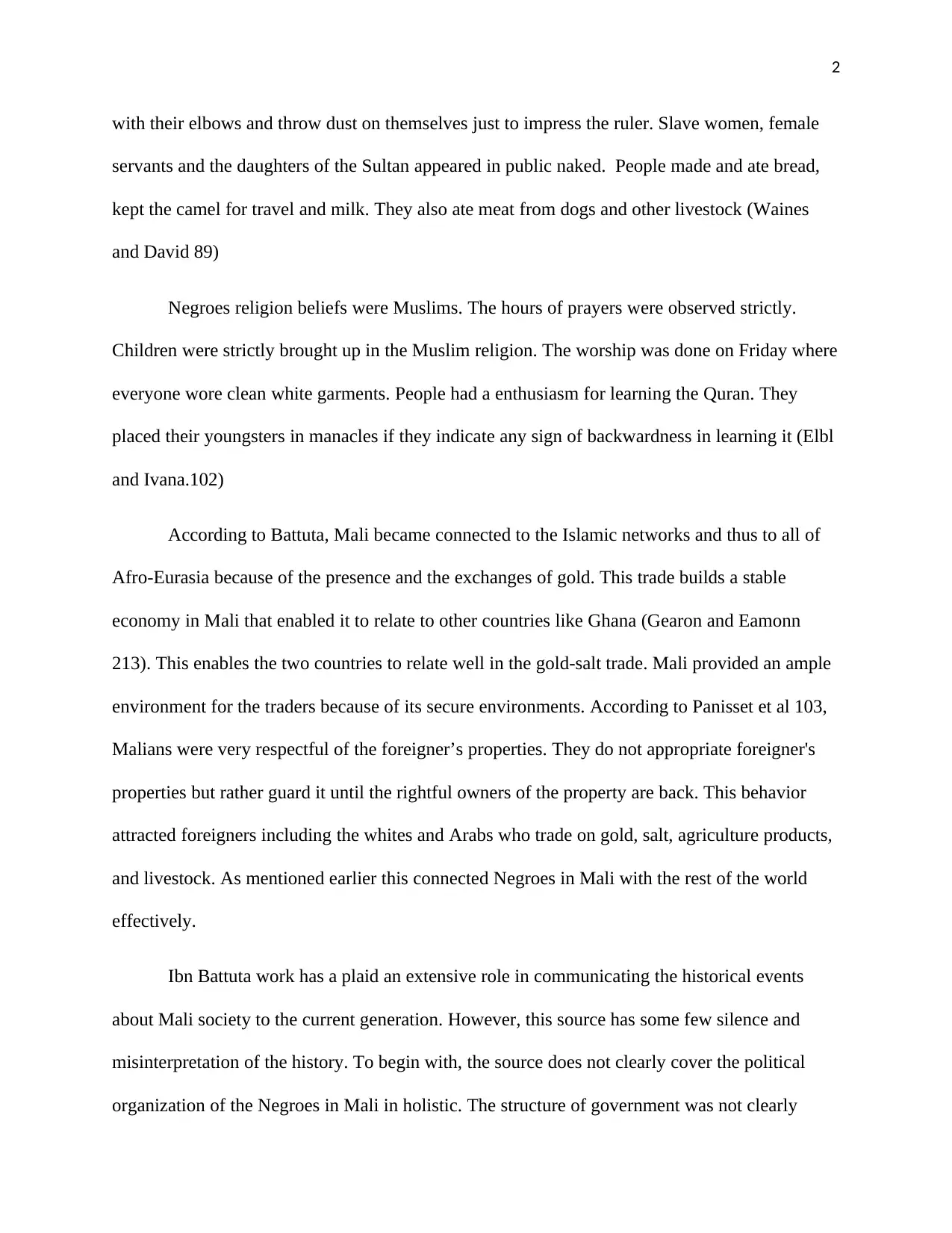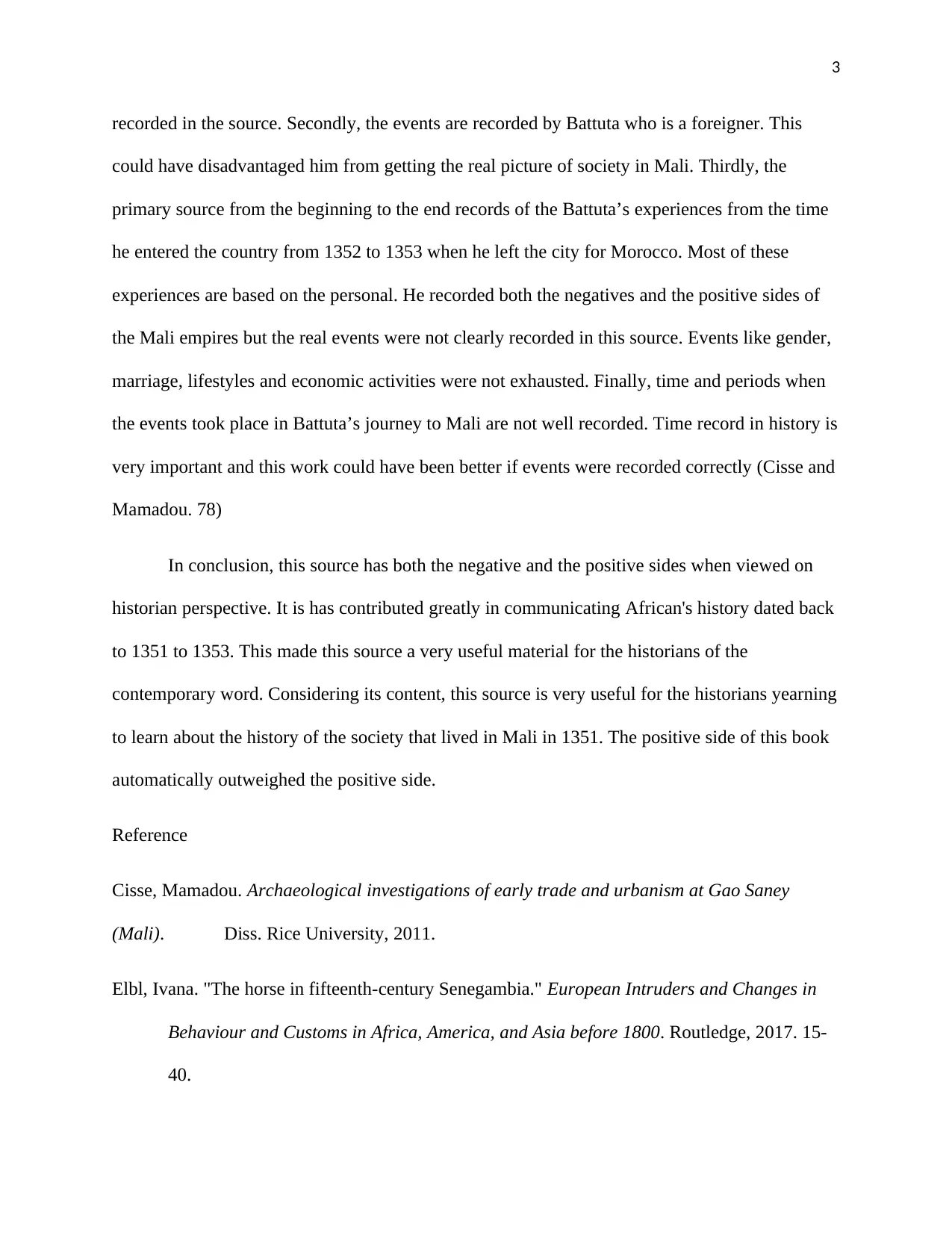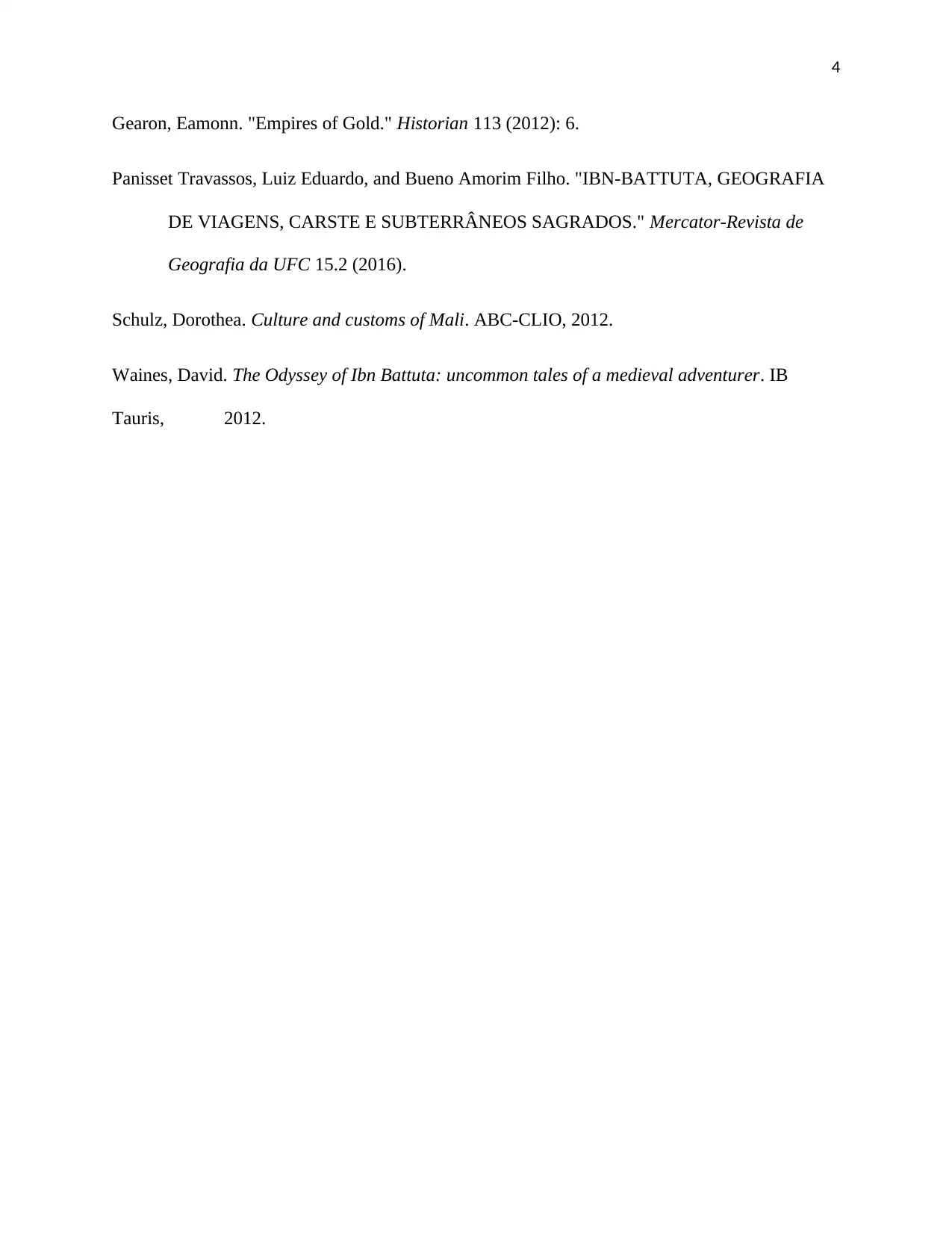Assessing Ibn Battuta's Visit to Mali: A Historical Analysis
VerifiedAdded on 2023/06/07
|4
|1018
|348
Essay
AI Summary
This essay examines Ibn Battuta's visit to Mali in 1352, using it as a primary source to understand the history of African societies. The paper discusses the reliability of Ibn Battuta's account, highlighting both its strengths and weaknesses in portraying the political, social, economic, and religious aspects of the Mali Empire. It explores Ibn Battuta's initial impressions, the political structure under Mansa Sulayman, the lifestyles of the people, and the prevalence of Islam. The essay also acknowledges the limitations of the source, such as its potential biases and incomplete coverage of certain aspects of Malian society, while recognizing its contribution to historical understanding. The essay concludes by emphasizing the importance of the source for historians and its impact on communicating African history.

1
Name
Of the student
Professor’s name
Date
World History
According to Schulz and Dorothea 113, history is kept alive by recording all the events
precisely the way they happened. Evident is very important when it comes to the real history of
African and World societies. What makes history an important field is the ability to link the
available materials to the events that happened in the past. This paper main intent is to assess Ibn
Battuta visit in Mali (1352) as a primary source to describe the history of Africans. This paper
also discusses the reliabilities of this source to pass the real historical events to historians.
Ibn Battuta’s preliminary impressions of Mali were not positive. He was offended by the
act of the local governor at Walata town who denied him a direct conversation. Politically, the
Mali Empire was headed by the king Mansa Sulayman who made all political decisions in the
empire. He was the one who decided what judgment deserves all the offenders. He had no mercy
to anyone found guilty. He ruled with just and fairness in his judgments. The king was assisted
by the governors at the town level who executed their duties as directed by the King (Waines and
David 89)
People lifestyles were highly dictated by the monarchy. The ruler was highly respected
and treated with humility. People dressed in rags before appearing at the palace. Hit the ground
Name
Of the student
Professor’s name
Date
World History
According to Schulz and Dorothea 113, history is kept alive by recording all the events
precisely the way they happened. Evident is very important when it comes to the real history of
African and World societies. What makes history an important field is the ability to link the
available materials to the events that happened in the past. This paper main intent is to assess Ibn
Battuta visit in Mali (1352) as a primary source to describe the history of Africans. This paper
also discusses the reliabilities of this source to pass the real historical events to historians.
Ibn Battuta’s preliminary impressions of Mali were not positive. He was offended by the
act of the local governor at Walata town who denied him a direct conversation. Politically, the
Mali Empire was headed by the king Mansa Sulayman who made all political decisions in the
empire. He was the one who decided what judgment deserves all the offenders. He had no mercy
to anyone found guilty. He ruled with just and fairness in his judgments. The king was assisted
by the governors at the town level who executed their duties as directed by the King (Waines and
David 89)
People lifestyles were highly dictated by the monarchy. The ruler was highly respected
and treated with humility. People dressed in rags before appearing at the palace. Hit the ground
Paraphrase This Document
Need a fresh take? Get an instant paraphrase of this document with our AI Paraphraser

2
with their elbows and throw dust on themselves just to impress the ruler. Slave women, female
servants and the daughters of the Sultan appeared in public naked. People made and ate bread,
kept the camel for travel and milk. They also ate meat from dogs and other livestock (Waines
and David 89)
Negroes religion beliefs were Muslims. The hours of prayers were observed strictly.
Children were strictly brought up in the Muslim religion. The worship was done on Friday where
everyone wore clean white garments. People had a enthusiasm for learning the Quran. They
placed their youngsters in manacles if they indicate any sign of backwardness in learning it (Elbl
and Ivana.102)
According to Battuta, Mali became connected to the Islamic networks and thus to all of
Afro-Eurasia because of the presence and the exchanges of gold. This trade builds a stable
economy in Mali that enabled it to relate to other countries like Ghana (Gearon and Eamonn
213). This enables the two countries to relate well in the gold-salt trade. Mali provided an ample
environment for the traders because of its secure environments. According to Panisset et al 103,
Malians were very respectful of the foreigner’s properties. They do not appropriate foreigner's
properties but rather guard it until the rightful owners of the property are back. This behavior
attracted foreigners including the whites and Arabs who trade on gold, salt, agriculture products,
and livestock. As mentioned earlier this connected Negroes in Mali with the rest of the world
effectively.
Ibn Battuta work has a plaid an extensive role in communicating the historical events
about Mali society to the current generation. However, this source has some few silence and
misinterpretation of the history. To begin with, the source does not clearly cover the political
organization of the Negroes in Mali in holistic. The structure of government was not clearly
with their elbows and throw dust on themselves just to impress the ruler. Slave women, female
servants and the daughters of the Sultan appeared in public naked. People made and ate bread,
kept the camel for travel and milk. They also ate meat from dogs and other livestock (Waines
and David 89)
Negroes religion beliefs were Muslims. The hours of prayers were observed strictly.
Children were strictly brought up in the Muslim religion. The worship was done on Friday where
everyone wore clean white garments. People had a enthusiasm for learning the Quran. They
placed their youngsters in manacles if they indicate any sign of backwardness in learning it (Elbl
and Ivana.102)
According to Battuta, Mali became connected to the Islamic networks and thus to all of
Afro-Eurasia because of the presence and the exchanges of gold. This trade builds a stable
economy in Mali that enabled it to relate to other countries like Ghana (Gearon and Eamonn
213). This enables the two countries to relate well in the gold-salt trade. Mali provided an ample
environment for the traders because of its secure environments. According to Panisset et al 103,
Malians were very respectful of the foreigner’s properties. They do not appropriate foreigner's
properties but rather guard it until the rightful owners of the property are back. This behavior
attracted foreigners including the whites and Arabs who trade on gold, salt, agriculture products,
and livestock. As mentioned earlier this connected Negroes in Mali with the rest of the world
effectively.
Ibn Battuta work has a plaid an extensive role in communicating the historical events
about Mali society to the current generation. However, this source has some few silence and
misinterpretation of the history. To begin with, the source does not clearly cover the political
organization of the Negroes in Mali in holistic. The structure of government was not clearly

3
recorded in the source. Secondly, the events are recorded by Battuta who is a foreigner. This
could have disadvantaged him from getting the real picture of society in Mali. Thirdly, the
primary source from the beginning to the end records of the Battuta’s experiences from the time
he entered the country from 1352 to 1353 when he left the city for Morocco. Most of these
experiences are based on the personal. He recorded both the negatives and the positive sides of
the Mali empires but the real events were not clearly recorded in this source. Events like gender,
marriage, lifestyles and economic activities were not exhausted. Finally, time and periods when
the events took place in Battuta’s journey to Mali are not well recorded. Time record in history is
very important and this work could have been better if events were recorded correctly (Cisse and
Mamadou. 78)
In conclusion, this source has both the negative and the positive sides when viewed on
historian perspective. It is has contributed greatly in communicating African's history dated back
to 1351 to 1353. This made this source a very useful material for the historians of the
contemporary word. Considering its content, this source is very useful for the historians yearning
to learn about the history of the society that lived in Mali in 1351. The positive side of this book
automatically outweighed the positive side.
Reference
Cisse, Mamadou. Archaeological investigations of early trade and urbanism at Gao Saney
(Mali). Diss. Rice University, 2011.
Elbl, Ivana. "The horse in fifteenth-century Senegambia." European Intruders and Changes in
Behaviour and Customs in Africa, America, and Asia before 1800. Routledge, 2017. 15-
40.
recorded in the source. Secondly, the events are recorded by Battuta who is a foreigner. This
could have disadvantaged him from getting the real picture of society in Mali. Thirdly, the
primary source from the beginning to the end records of the Battuta’s experiences from the time
he entered the country from 1352 to 1353 when he left the city for Morocco. Most of these
experiences are based on the personal. He recorded both the negatives and the positive sides of
the Mali empires but the real events were not clearly recorded in this source. Events like gender,
marriage, lifestyles and economic activities were not exhausted. Finally, time and periods when
the events took place in Battuta’s journey to Mali are not well recorded. Time record in history is
very important and this work could have been better if events were recorded correctly (Cisse and
Mamadou. 78)
In conclusion, this source has both the negative and the positive sides when viewed on
historian perspective. It is has contributed greatly in communicating African's history dated back
to 1351 to 1353. This made this source a very useful material for the historians of the
contemporary word. Considering its content, this source is very useful for the historians yearning
to learn about the history of the society that lived in Mali in 1351. The positive side of this book
automatically outweighed the positive side.
Reference
Cisse, Mamadou. Archaeological investigations of early trade and urbanism at Gao Saney
(Mali). Diss. Rice University, 2011.
Elbl, Ivana. "The horse in fifteenth-century Senegambia." European Intruders and Changes in
Behaviour and Customs in Africa, America, and Asia before 1800. Routledge, 2017. 15-
40.
⊘ This is a preview!⊘
Do you want full access?
Subscribe today to unlock all pages.

Trusted by 1+ million students worldwide

4
Gearon, Eamonn. "Empires of Gold." Historian 113 (2012): 6.
Panisset Travassos, Luiz Eduardo, and Bueno Amorim Filho. "IBN-BATTUTA, GEOGRAFIA
DE VIAGENS, CARSTE E SUBTERRÂNEOS SAGRADOS." Mercator-Revista de
Geografia da UFC 15.2 (2016).
Schulz, Dorothea. Culture and customs of Mali. ABC-CLIO, 2012.
Waines, David. The Odyssey of Ibn Battuta: uncommon tales of a medieval adventurer. IB
Tauris, 2012.
Gearon, Eamonn. "Empires of Gold." Historian 113 (2012): 6.
Panisset Travassos, Luiz Eduardo, and Bueno Amorim Filho. "IBN-BATTUTA, GEOGRAFIA
DE VIAGENS, CARSTE E SUBTERRÂNEOS SAGRADOS." Mercator-Revista de
Geografia da UFC 15.2 (2016).
Schulz, Dorothea. Culture and customs of Mali. ABC-CLIO, 2012.
Waines, David. The Odyssey of Ibn Battuta: uncommon tales of a medieval adventurer. IB
Tauris, 2012.
1 out of 4
Your All-in-One AI-Powered Toolkit for Academic Success.
+13062052269
info@desklib.com
Available 24*7 on WhatsApp / Email
![[object Object]](/_next/static/media/star-bottom.7253800d.svg)
Unlock your academic potential
Copyright © 2020–2026 A2Z Services. All Rights Reserved. Developed and managed by ZUCOL.